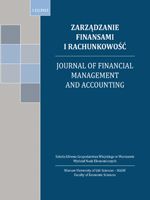Main Article Content
Article Details
BURCHELL S., CLUBB C., HOPWOOD A., HUGHES J., NAHAPIET J. 1980: The roles of accounting in organizations and society. Accounting, Organizations and Society, 5 (1), p. 5-27. (Crossref)
Cabinet of Ministers of Ukraine 2007: The strategy of applying IFRS in Ukraine. Retrieved from http://zakon4.rada.gov.ua/laws/show/911-2007-р, [data dostępu 01.10.2016].
CHAPMAN C. S., COOPER D., MILLER, P. 2009: Accounting, organizations, and institutions: Essays in Honour of Anthony Hopwood, Oxford University Press, Oxford.
COASE R. 2007: The Firm, the Market, and the Law. New publication. (in Russian) Moscow.
DiPIAZZA S., ECCLES R. 2002: Building public trust: The Future of Corporate Reporting. John Wiley & Sons, New York.
HODGSON G. 2003: Economics and Institutions: A Manifesto for a Modern Institutional Economics. Business. (in Russian) Moscow.
HOPWOOD A.G., MILLER P. 1994: Accounting as a social and institutional practice, Cambridge University Press, Cambridge.
HORNGREN C. 1973: Marketing of accounting standards. Journal of Accountancy, 136.4, p. 61-66.
SOKOLOV YA., PALIY V. 1981: Automated management systems and problems of accounting theory, Finance and Statistics, Moscow.
STIGLITZ J. 1993: The Role of the State in Financial Markets. In The World Bank Annual Conference on Development Economics, Retrieved from http://www-wds.worldbank.org/servlet/WDSContentServer/IW3P/IB/1994/03/01/000009265_3970702134931/Rendered/PDF/multi_page.pdf, s. 19-52, [data dostępu: 01.08.2016]. (Crossref)
Verkhovna Rada of Ukraine 1999: Law of Ukraine "On Accounting and Financial Reporting in Ukraine". Retrieved from http://zakon5.rada.gov.ua/laws/show/996-14, [data dostępu: 01.08.2016].
WATTS R.L., ZIMMERMAN J.L. 1979: The Demand for and Supply of Accounting Theories: The Market for Excuses. The Accounting Review, 54 (2), p. 273-305.
WATTS R.L., ZIMMERMAN J.L. 1990: Positive Accounting Theory: A Ten Year Perspective, The Accounting Review, 65 (1), p. 131-156.
WAYMIRE G.B., BASU S. 2007: Accounting is an Evolved Economic Institution. Foundations and Trends® in Accounting FNT in Accounting, 2 (1-2), p. 1-174. (Crossref)
ZHUK V. 2008: The concept of accounting development in the agricultural sector of Ukraine (draft), Accounting and Finance of Agro-Industrial Complex, 3, p. 82-89.
ZHUK V. 2013: Fundamentals of institutional accounting theory, Agricultural Science, Kyiv.
Downloads
- Valeriy Zhuk, Institutional basis for development of investment processes in agrarian economy of Ukraine , Zarządzanie Finansami i Rachunkowość : Vol. 3 No. 1 (2015)




